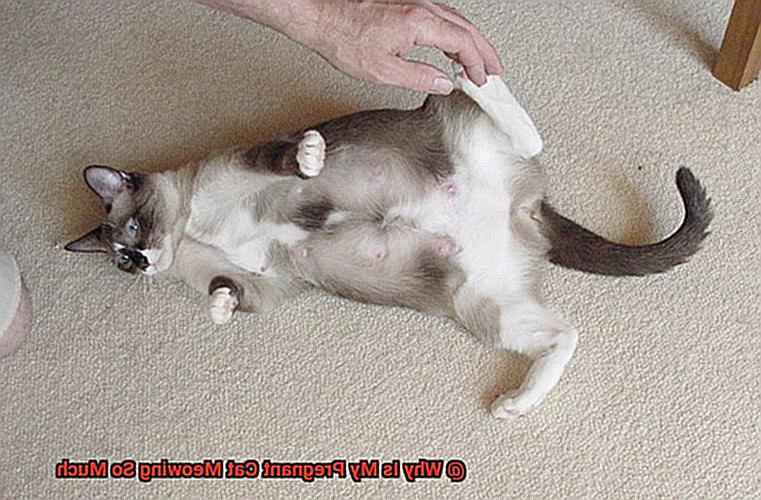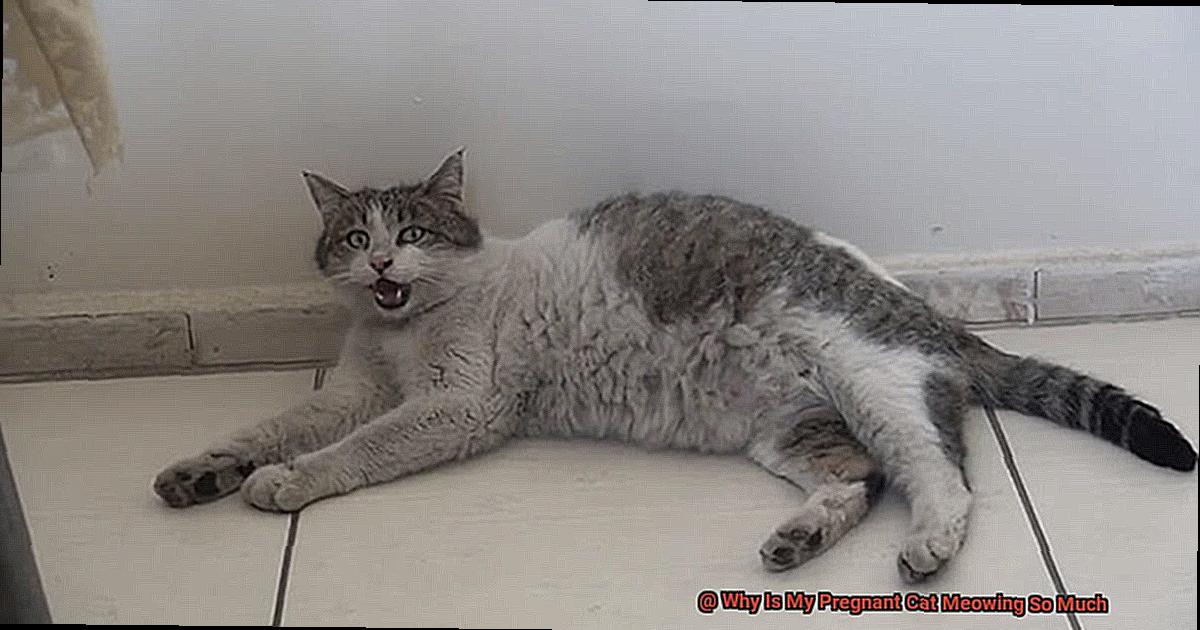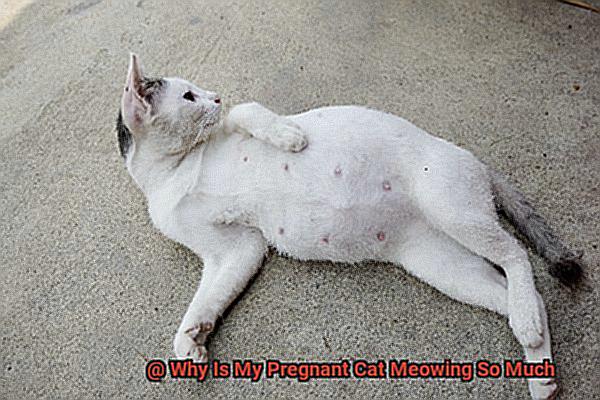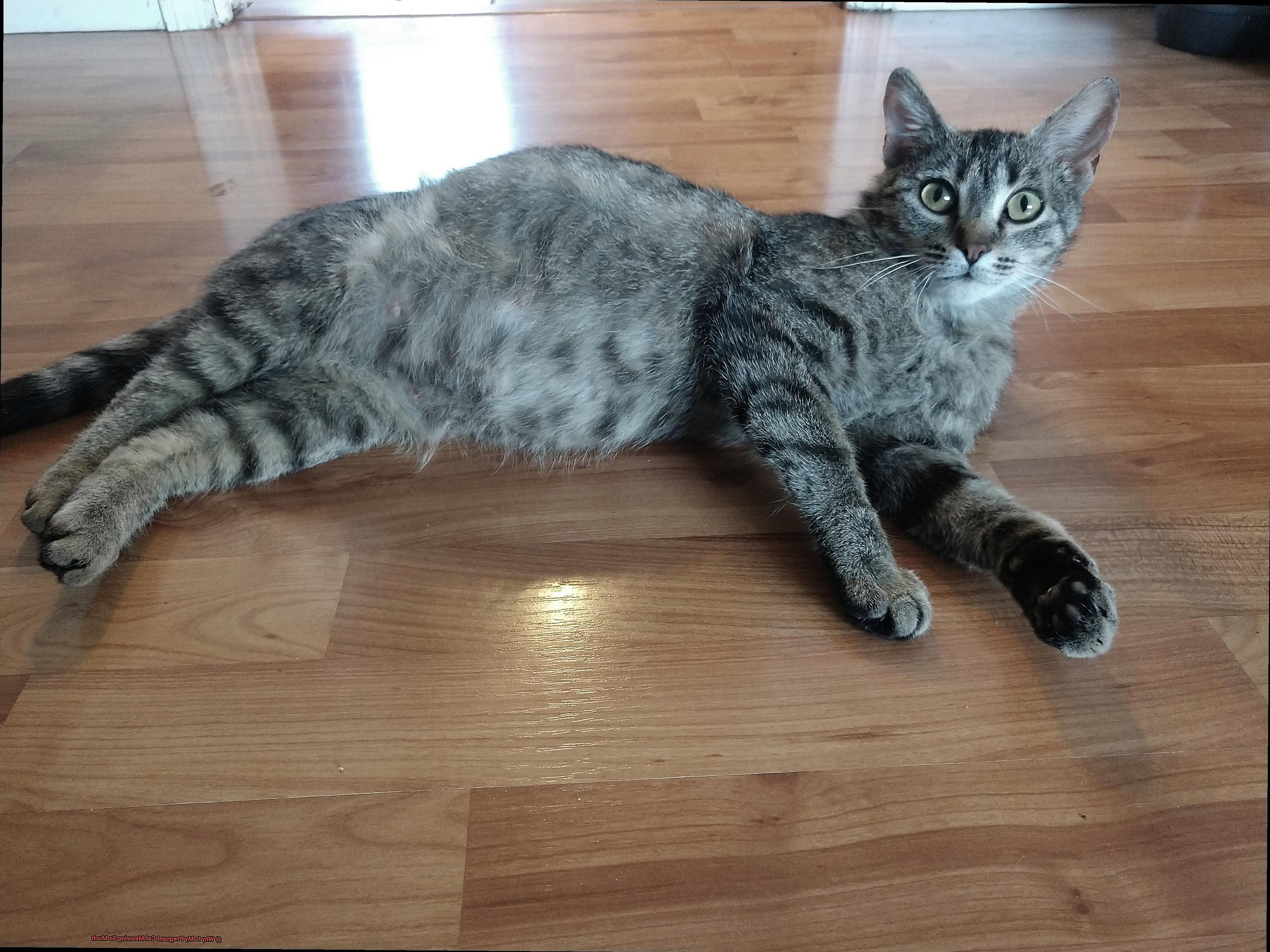Are you wondering why your pregnant cat is meowing so much? You may be concerned, but the good news is that there’s likely nothing to be worried about.
In this blog post, we’ll discuss why your pregnant cat is meowing and how you can encourage her to be happy during this special season.
We’ll answer the question, “Why is my pregnant cat meowing so much?” and provide helpful tips on what you can do to make sure she stays healthy and content. So if you’re looking for answers, read on!
Signs of Pregnancy in Cats
You may be wondering what signs to look out for in order to confirm that your furry friend is expecting. Here are some of the physical changes that occur during pregnancy in cats.
Your cat may begin to gain weight and appear “fluffy.” Additionally, their nipples will become enlarged and darkened in color.
While some cats may experience a decrease in appetite, this is not always the case. As the pregnancy progresses, their abdomen will become larger and rounder.
In addition to physical changes, your cat’s behavior may also shift; it may become more affectionate or distant, depending on the individual cat.
Toward the end of the pregnancy, cats often start to nest by gathering blankets or other items around them.
If you notice any of these signs in your beloved pet, it’s likely that they are pregnant! Make sure to provide them with extra love and care as they go through this special time.
Why do cats begin to nest before giving birth?
It’s essential to keep an eye out for nesting behavior in your pregnant cat. Nesting is a definite sign that your cat is about to give birth.
Your cat will start searching for a safe and secure spot where she can deliver her kittens. She may choose to hide in dark places or curl up in small spaces. Additionally, she may begin to scratch and claw at soft materials such as blankets, towels, or rugs. This behavior is her way of getting ready for the arrival of her little ones.

It’s important that you provide your cat with a comfortable environment where she can give birth without any disturbance or fear. This will help her feel relaxed and at ease during the birthing process.
Hormonal Changes
Pregnancy is an exciting time for cats and their owners alike. During this period, cats experience a surge of hormones such as progesterone and estrogen that can cause them to meow more frequently.
Not only that, but these hormones can also amplify their need for attention and affection from their owners.
They may also become more territorial in order to protect their unborn kittens.
Lastly, some cats may feel anxious or stressed due to changes in their environment or the presence of other animals in the home. It’s important to be understanding and supportive during this period by providing extra love and care to your cat.
Increased Meowing
Increased meowing is often a sign of labor in cats, so it’s important to be aware of this behavior.
When cats are in labor, they may meow more frequently due to the discomfort caused by contractions and pain.
This meowing can also be caused by anxiety or fear. It’s important to note that increased meowing could also indicate other medical conditions, such as urinary tract infections or other illnesses.
If your cat is meowing excessively, it is essential to take her to the vet for a checkup. Providing a calm and comfortable environment for your pregnant cat during this time can also be helpful, such as a quiet room away from noise and activity.
Knowing the signs of labor in cats is an essential part of being a responsible pet owner. If your cat is exhibiting this behavior excessively, keep an eye out for increased meowing and make sure to take her to the vet right away.
Reasons for Excessive Meowing in Pregnant Cats
Pregnant cats can be quite vocal, meowing more often than usual. But why is this? Excessive meowing in pregnant cats is a common occurrence, and there are several potential causes behind it.
Hormonal changes may be to blame, as these can make cats more vocal. Stress is another possibility, as changes in their environment or the presence of other animals can cause them to feel anxious and meow more often. Pain can also lead to excessive meowing, whether it’s physical discomfort or labor pains.
Hunger is another explanation for excessive meowing in pregnant cats.

With their increased appetite during pregnancy, they need more food than ever before and may become more vocal when they want something to eat. Attention-seeking behavior could also be the culprit, as some cats may just be trying to capture your attention.
Signs of Painful Labor
Being aware of the signs of a difficult delivery is essential so that you can seek veterinary help in time. Painful labor can be experienced by cats just as it can by humans.
If your cat is meowing excessively, panting, or refusing to eat or drink, then these are all signs of a painful labor.
It’s important to take them to the vet as soon as possible if they’re displaying any of these symptoms.
When should I seek veterinary help?
Veterinary assistance is essential for cats suffering from painful labor, as it can lead to more serious complications such as a difficult delivery or even stillbirth. Thankfully, veterinarians are specially trained to provide relief and ensure that the delivery goes as smoothly as possible.
If you think your cat is in pain during labor, don’t hesitate—seek out expert help right away.
How to care for a cat after giving birth
Here are some tips to keep your cat and her babies happy and healthy.
First and foremost, make sure your cat has access to fresh water and food at all times.

Additionally, keep her in a warm, quiet area away from other cats and children to help her recover quickly. It’s also essential to monitor the mother cat for any signs of infection or illness, as well as check the kittens regularly for any distress or illness.
It’s also important to ensure that the mother cat is nursing her kittens properly, providing them with the essential nutrients and antibodies they need.
To prevent infections from spreading, clean up any messes quickly and thoroughly.
Don’t forget to provide a litter box for the mother cat and her kittens so they have somewhere comfortable to go when needed.
Rehoming Litters of Kittens
Rehoming litters of kittens is an important responsibility for many cat owners.
There are a variety of options available, such as adoption through a local shelter or rescue organization, finding homes through friends and family, or posting listings online.
When rehoming kittens, it’s essential to make sure the new home is safe and secure. It’s also important to ensure that the new home has enough space and resources to provide for the kittens’ needs, such as food and medical care.
Additionally, the new home should be able to offer socialization and companionship to the kittens.

It’s also critical to consider if the new home will be able to provide long-term care for the kittens. Too often cats are surrendered back into shelters after only a few months due to changes in lifestyle or lack of resources.
Before rehoming any kittens, make sure that potential adopters are willing and able to make a long-term commitment.
Finally, you’ll have to consider the additional costs associated with rehoming litters of kittens. This may include spaying and neutering fees, vaccinations, deworming treatments, flea prevention medications, and transportation costs if you are unable to deliver them yourself.
Make sure all expenses are covered before rehoming your litter of kittens.
Also Read: Why Is Cat Walking Low To The Ground And Meowing?
Conclusion
To sum it up, there are a variety of reasons why your pregnant cat may be meowing more than usual.
Hormonal changes, hunger, and attention-seeking are all common causes. It’s important to stay alert for signs of labor and take your cat to the vet if they appear distressed or in pain.
After giving birth, provide your cat with fresh water and food, a safe environment away from other cats and children, and regular monitoring for infection or disease.
When rehoming litters of kittens, make sure that potential adopters are willing to provide long-term care before committing.

